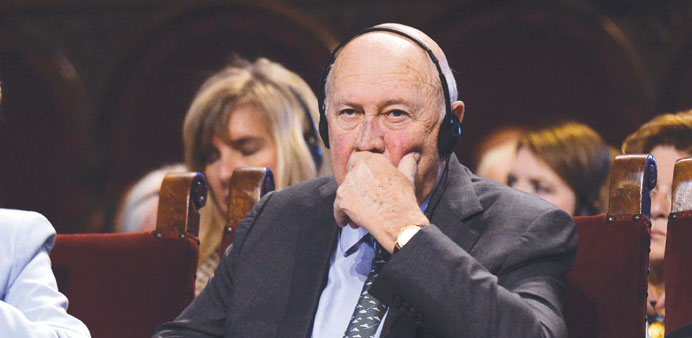De Klerk at the opening ceremony of the XV World Summit of Nobel Peace Laureates at the University of Barcelona, yesterday.
Nobel Peace Prize laureate and former South African leader FW de Klerk warned yesterday that “uncontrolled” immigration could harm European states, pointing to a wave of xenophobic attacks that hit his country this year.
Speaking in Barcelona at an annual gathering of Nobel laureates, the man credited for ending apartheid in South Africa together with Nelson Mandela said that allowing too many jobless people to come at once could pose a risk.
“There is a risk ... of unemployment becoming a problem, of newcomers prepared to work outside the labour regulations of the country,” the 79-year-old told reporters. “When I say this, I’m talking about experience in South Africa. About 10% of our population are illegal immigrants. They’re prepared to work outside the labour laws, below the minimum wage, and some employers make use of this.
“And this has led on a number of occasions to the local population saying ‘you’re taking our jobs’ and to incidents of xenophobia in South Africa.”
The country was hit by a wave of attacks on migrants earlier this year that saw at least seven people killed as mobs hunted down workers from Zimbabwe, Mozambique and other African states.
The violence, in a country plagued by high unemployment, forced hundreds of terrified families to abandon their homes and seek safety in camps.
“Uncontrolled and unregulated immigration can have very negative consequences,” he said.
He nevertheless praised countries like Germany and Sweden that have opened their doors to refugees.
“But I think the time has arrived for better regulation and better co-ordination,” he said, calling on the European Union to tackle the refugee crisis at its core.
He said more aid should be given to countries such as Jordan where hundreds of thousands of refugees have amassed as they flee neighbouring Iraq and Syria.
He also called on countries in the Middle East to co-operate on tackling jihadist groups waging the violence pushing people to leave their homelands.

